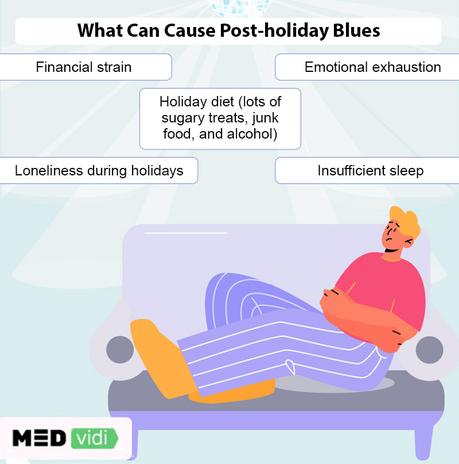and How to Deal With It
- 4 January, 23
 Depression
What is Post-holiday Blues and How to Deal With It
Depression
What is Post-holiday Blues and How to Deal With It
The end-of-year holidays are long and demand more emotion and finances than other holidays. Therefore, you can quickly slip into post-vacation depression. In fact, statistics indicate that 68% report financial strains after the Christmas season, while 63% experience lots of pressure.
Moreover, individuals who spend the holidays alone experience loneliness and sadness. Therefore, while some start the New Year with a bang, others enter a post-Christmas depression phase. Read on to learn more about post-holiday blues and how to overcome them.
Are you feeling depressed? We are here to support you.
See A Therapist OnlineCauses of Post-Holiday Blues
The long holidays from Thanksgiving to New Year’s Eve usually interfere with your routine. You delight in lots of food and dessert, increased alcohol intake, merry-making with friends and family, and fewer hours of sleep.
Generally, people want to enjoy the holidays as much as possible before they resume their routine in January. However, without realizing it, some of these Christmas activities lead to depression after vacation. People find themselves having post-holiday blues, meaning sadness, depression, and anxiety experienced after the holidays.
The most common causes of post-holiday blues are:
- Financial strain. With friends and family coming over for Christmas, you must shop for enough food, decorations, and gifts for the party. For some, the vacation may cost more than you had anticipated which could induce stress.
- Emotional exhaustion. The excitement of being with your loved ones and anticipation of the holiday season usually gives you an emotional high. Strained relationships and staying calm around relatives you aren’t fond of can also be stressful. Therefore, when the holidays are over, the drop in your emotional excitement can result in depression.
- Holiday diet. You find that during the holiday season, you consume lots of sugary treats, desserts, junk food, and alcohol. Research indicates that alcohol, junk food, and overeating quickly lead to depression.
- Insufficient sleep. Traveling, late-night movies, and staying up to decorate the house or wrap gifts significantly interfere with your sleep schedules.
Symptoms of Post-Vacation Blues
The post-vacation syndrome comes with the following symptoms once the holiday ends:
- Anxiety
- Low energy level
- Insomnia
- Low mood
- Increased irritability
- Financial worries
- Feeling of emptiness
- Intense nostalgia
- Loss of appetite
Generally, post-holiday blues last for a short duration, like 2 to 3 weeks. When the holiday blues stay for more than a month, visit your doctor. Additionally, check if post-Christmas depression is an excuse for recurring depression. If this is the case, it’s time to see your physician.
We will help you identify the root causes of depression and will develop a treatment plan that will suit your needs.
Treat Depression OnlineHow to Get Over Post-Holiday Blues
Coping with the post-holiday blues will help you increase productivity at work and regain emotional stability. The following tips will ensure you overcome post-holiday depression.
1. Practice self-care
You don’t have to beat yourself up for feeling blue, do something that will make you feel better instead. Take some time to analyze how you feel and devise ways of lifting your moods. After a season of overeating, little sleep, and snuggling, your body could require some self-care.
2. Create a routine
Your body became accustomed to a more relaxed schedule during the holidays. Although it’ll fight to retain a state of relaxation, your body will benefit more from a routine. This way, you can resume healthy eating habits, start exercising, go for walks, and ensure you get adequate sleep. These small daily habits will revitalize your body and create a sense of well-being. Besides, they will help you beat depression after Christmas before it becomes a medical concern. Instead of slipping into depression and having low energy, you will keep active and productive after the holidays.
3. Connect with loved ones
Get in touch with friends to avoid feeling lonely after Christmas. Be around people who bring you joy any time of the year. You can watch movies together, share jokes, or go out on weekends. This way, you’ll build new memories instead of feeling nostalgic about the holidays.
4. Schedule time for fun
You might have engaged in ice skating or snowboarding during the holidays. Therefore, returning to less fun and more work might make you depressed after vacation. However, you can bring some merriment into your life by slotting some fun hours into your weekend.
5. Set a financial plan
The realization that you are broke once the holiday ends can also cause depression after Christmas. If you overspent money during Christmas, now in January, you might realize you barely have enough to get through to your next paycheck. To avoid frustration, craft a budget plan to control your expenses and ensure you stick to it.
Does self-help seem not to be enough? See a doctor to get medications or psychological support.
Book An Appointment
In Conclusion
Post-holiday blues can interfere with your productivity at work and eliminate all the feelings of joy you had over Christmas. However, learning to overcome post-vacation blues with the tips listed above will ensure you regain your footing as you start your year. If you notice the symptoms remain for too long, seek professional help and get a personalized plan for overcoming depression.

Real help for Depression.
Beat your symptoms with our expert advice.





- Depression Diagnosis
- Depression help
- Depression symptoms
- Depression Treatment
- How to get over post-holiday blues
- Post-Christmas depression
- Post-vacation depression
